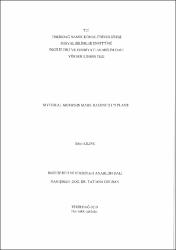| dc.contributor.author | Kılınç, Sibel | |
| dc.date.accessioned | 2021-07-12T10:51:42Z | |
| dc.date.available | 2021-07-12T10:51:42Z | |
| dc.date.issued | 2019 | |
| dc.identifier.uri | https://hdl.handle.net/20.500.11776/3930 | |
| dc.description.abstract | The focus of this study is to discuss the mythical motifs in Mark Ravenhill's plays; Shopping and Fucking, Faust is Dead and Some Explicit Polaroids, in relation to their positioning in the postmodern culture with the liberal capitalist systems. The concepts of relationships as a site of economic exchange, the quality of choice in market economies, free will, subject, knowledge and power are investigated through the theories of prominent postmodernist philosophers such as Gilles Deleuze, Felix Guattari, Michel Foucault and Francois Lyotard. Moreover, the provocative nature of the plays as a part of being representative of in-yer-face theatre is further explained in its historical and socio-cultural context. Such investigation not only brings political issues to the forefront, emphasizing the cultural change and its impact on individual lives but also the change in theatrical concepts of their milieu. Shopping and Fucking investigates the autonomy of the individual, the idea of sacrifice and suffering as a way to come to self-realization, the body as a place of control in authenticating the self and sexual relationships as a site of transaction. Faust is Dead explores the issues such as alienation, the loss of faith in the progress of man, the authenticity of experience, desire and the reconcilability of the phenomenal and noumenal worlds. In the last play, Some Explicit Polaroids examines the hedonism and the capitalist values that the younger generations adopt, contrasted with the values of older generations, the positivist decay experienced by twenty-somethings which is also a part of capitalism, the masculinity crisis, violence and abuse on the body and the transition from disciplined to controlled societies.Also, shopping myth which was found to be encompassing all the plays was inverted by the playwright through transforming the act of shopping from being personal and limited to the objects to be public and including humans and their emotions. | en_US |
| dc.description.abstract | Bu çalışma Mark Ravenhill'in Shopping and Fucking, Faust is Dead ve Some Explicit Polaroids oyunlarindaki mitsel motiflerin liberal kapitalist sistemde, postmodern kültür içerisinde konumlandirildiğindaki ilişkisi üzerinde durmaktadir. İlişkilerin ekonomik faaliyet alanının bir parcasi olmasi, piyasa ekonomisi içerisinde seçimin niteligi, özgür irade, özne, bilgi ve iktidar kavramlari, Gilles Deleuze, Félix Guattari, Michel Foucault ve François Lyotard gibi önde gelen postmodernist filozoflar ve teorileri aracılığıyla incelenmistir. Dahası, bu oyunlarin Suratina ("in-yer-face") Tiyatroyu temsil etmesinden kaynaklanan kıskırtıcı doğası tarihi ve sosyo-kültürel bağlamı içerisinde detaylı açıklanmıştır. Bu incelemeler sadece kültürel değişim ve bu değişimlerin kişilerin yaşamları üzerindeki etkilerini vurgulayarak sadece politik sorunlari degil, ayni zamanda donemin teatral değişimlerini de ön plana taşımıştır. Shopping and Fucking oyununda bireyin otonomisi, kendini gerçekleştirmede fedakarlik ve acı kavramları, varoluşun kanıtlanmasında bedenin bir kontrol alanı olarak yeri ve cinsel iliskiler ekonomik faaliyet alanı içerisinde incelenmistir. Faust is Dead oyununda yabancılaşma, insanin ilerlemesine olan inancın yitirilmesi, tecrubenin gerçekligi, arzu ile fenomen ve numen dünyalar arasındaki uzlaşabilirlik araştırılmıştır. Son oyun olan Some Explicit Polaroids' de ise genç nesillerin benimsedigi hedonist ve kapitalist değerler, daha önceki nesillerin değerleriyle kıyaslanmış, yirmilerindeki bir grup insanın tecrübe ettiği, kapitalizmin de bir parcasi olan pozitivist çürüme, erkeklik krizi, bedene yapılan şiddet ve taciz ile disiplin toplumlarından kontrol toplumlarına geçiş incelenmistir. Ayrıca bütün oyunları içine alan alışveriş mitinin yazar tarafindan değiştirilerek kişisel ve nesnelerle sınırlı olan alışveriş eyleminin, insanları ve duygularını da içine alan bir eyleme dönüştürdüğü anlasilmistir. | en_US |
| dc.language.iso | eng | en_US |
| dc.publisher | Namık Kemal Üniversitesi | en_US |
| dc.rights | info:eu-repo/semantics/openAccess | en_US |
| dc.subject | Mit | en_US |
| dc.subject | Mitsel öğeler | en_US |
| dc.subject | Mitsel motifler | en_US |
| dc.subject | Mutlu dünya miti | en_US |
| dc.subject | Alışveriş miti | en_US |
| dc.subject | Postmodernizm | en_US |
| dc.subject | Kapitalizm | en_US |
| dc.subject | Piyasa ekonomisi | en_US |
| dc.subject | Biyopolitik | en_US |
| dc.subject | İn-yer-face tiyatro | en_US |
| dc.subject | Postyapısalcılık | en_US |
| dc.subject | Drama | en_US |
| dc.subject | Yabancılaşma | en_US |
| dc.subject | Varoluşçuluk | en_US |
| dc.subject | Myth | en_US |
| dc.subject | Mytheme | en_US |
| dc.subject | Mythical motifs | en_US |
| dc.subject | Happy world myth | en_US |
| dc.subject | Sopping myth | en_US |
| dc.subject | postmedernism | en_US |
| dc.subject | Capitalism | en_US |
| dc.subject | Market economy | en_US |
| dc.subject | Biopolitics | en_US |
| dc.subject | İn-yer face theatre | en_US |
| dc.subject | post-structuralism | en_US |
| dc.subject | Alienation | en_US |
| dc.subject | Existentialism | en_US |
| dc.title | Mythical motifs in mark ravenhill’s plays | en_US |
| dc.title.alternative | Mark Ravenhill'in oyunlarindaki mitsel motifler | en_US |
| dc.type | masterThesis | en_US |
| dc.department | Enstitüler, Sosyal Bilimler Enstitüsü, İngiliz Dili ve Edebiyatı Ana Bilim Dalı | en_US |
| dc.relation.publicationcategory | Tez | en_US |



















